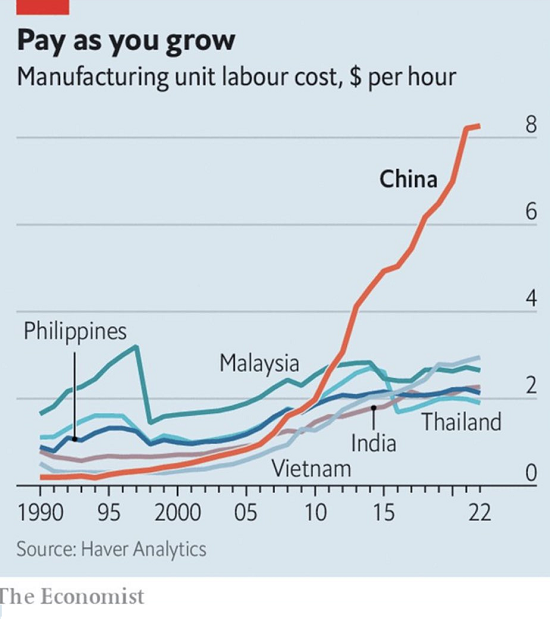Look Out Below
As I often note, making Plans B and C is free.
The stock market is always looking past "bad news" to front-run "good news."
Once it became clear that the Titanic was indeed going to sink, the stock market would rally on the prospect of sharp growth in lifeboat shares. In other words, never mind the bad news, let's look beyond that and find some reason to rally.
This is a pattern that's easily visible in the past two decades. When it became clear that Covid was becoming a global pandemic, the US stock market rallied for weeks, something that struck sober analysts as completely disconnected from reality. Eventually reality intruded and the market crashed.
The same dynamic was also apparent in the run-up to the 2000 dot-com implosion--stocks rallied right up to March 6, 2000, before starting a two-year long controlled demolition--and the 2008-09 stock market crash, when shares of visible doomed General Motors and Fannie Mae both maintained lofty valuations that were completely disconnected from a painfully visible reality. (Fannie Mae shares went to near-zero in the subsequent crash.)
And so here we are again. The stock market is rallying despite overwhelming evidence that the US economy and global economy are heading for a deep recession. The justifications are either 1) the AI boom is changing everything or 2) the Federal Reserve will continue lowering interest rates and flood the market with liquidity, i.e. "The Fed Put" will save the stock market, just as its done for the past 25 years.
This assumption is completely detached from the painfully visible reality that the Fed and other central banks have finally awakened to the perverse consequences of "The Fed Put" (i.e. the policy of unleashing trillions in financial stimulus whenever the stock market swoons) and they are now responding to rallies based on front-running the (now viewed as guaranteed) Fed "save" of the stock market by reiterating their new policy which is to keep interest rates (bond yields) higher for longer. In other words, they are explicitly stating that they won't "save" the stock market because of 1) inflation and 2) the need to destroy the moral hazard created by "The Fed Put."
In the heady front-running rally prior to the crash, all seems well. Employment is strong, consumers are spending, etc.
The problem with this euphoric confidence is there are lag times between sharp increases in the cost of capital and goods and services and employment and spending. Notice how credit card balances have exploded higher. In previous recessions, reliance on credit cards to juice spending soared right up until the stock market began its free-fall. Then spending fell sharply.
The lag time is also visible in yield-curve inversions--long counted as a surefire precursor to recession. (When the 2-year Treasury bonds pays a higher yield than the long-term 30-year bond, this inverts the normal market in which longer-term bonds pay higher yields than short-term bonds.)
Many other indicators repeat the same message: we're at the cusp of a recession and market decline.
Many commentators note how tightening financial conditions take months to work through the economy, eventually affecting consumer spending, commercial borrowing, housing valuations, tax receipts, etc.
Globally, the forces pushing costs higher (i.e. inflation) cannot be reversed. Consider this chart of labor costs in China. As labor costs skyrocket, higher costs must be passed on to consumers.

There are also less easily measured trends at work. One factor that is not tracked and therefore poorly understood is how close to the edge many small businesses are. Those that survived the Covid lockdown have had to raise prices just to cover the sharp increases in their own costs. Small business isn't making big margins; rather, they're absorbing costs to keep the doors open. As some costs decline, they won't drop prices, as they need to finally make a profit.
Many owners are hovering on the edge of burnout, having compensated for higher costs by working longer hours themselves.
Any decline in consumer spending will push many of these business owners to finally give up. As for selling the business to new owners: few young people have the capital, appetite for risk and willingness to work long hours for uncertain returns to buy a small business. So the businesses close and there are no replacements: those enterprises, commercial spaces, employment and taxes paid all disappear, and they won't come back.
Those who operate small businesses themselves know that small business owners are viewed by local government as tax donkeys: they're business owners so they're doing well, let's jack up business license fees, etc.
Another factor is the change in speculative psychology once "investors" (i.e. gamblers) finally accept that the Titanic is in fact going to sink, that is, the Fed is not going to bail out the stock market with newly issued trillions. We can anticipate the stair-step down as confidence slips to denial, then anger, then grief and finally, acceptance.
As I often note, making Plans B and C is free. Making plans for how you'll respond to recession and/or a protracted stock market decline takes nothing but time. It's very difficult to act decisively before the herd turns and panics, which is why so few manage to do so.
We cannot anticipate every impact a recession and stock market free-fall will have on our household, but we can anticipate the possibility our income and wealth will be negatively affected and belt-tightening may be prudent. If the happy-crowd is right and there is no recession, having a plan didn't cost anything. But if the happy-crowd is wrong, those without a plan to act decisively before the herd panics will suffer more than those who had a plan and acted on it.

New podcast:
KunstlerCast 430: Finance and The Ultra-Processed Life (1 hr)
Check out my new book Ultra-Processed Life and my updated Books and Films.
Become
a $3/month patron of my work via patreon.com
Subscribe to my Substack for free
My recent books:
Disclosure: As an Amazon Associate I earn from qualifying purchases originated via links to Amazon products on this site.
Ultra-Processed Life print $16, (Kindle $7.95, Hardcover $20 (129 pages, 2025) audiobook Read the Introduction and first chapter for free (PDF)
The Mythology of Progress, Anti-Progress and a Mythology for the 21st Century print $16, (Kindle $6.95, audiobook, Hardcover $24 (215 pages, 2024) Read the Introduction and first chapter for free (PDF)
Self-Reliance in the 21st Century print $15, (Kindle $6.95, audiobook $13.08 (96 pages, 2022) Read the first chapter for free (PDF)
When You Can't Go On: Burnout, Reckoning and Renewal $15 print, $6.95 Kindle ebook; audiobook Read the first section for free (PDF)
Global Crisis, National Renewal: A (Revolutionary) Grand Strategy for the United States (Kindle $6.95, print $16, audiobook) Read Chapter One for free (PDF).
A Hacker's Teleology: Sharing the Wealth of Our Shrinking Planet (Kindle $6.95, print $15, audiobook $17.46) Read the first section for free (PDF).
Will You Be Richer or Poorer?: Profit, Power, and AI in a Traumatized World
(Kindle $3.95, print $12, audiobook) Read the first section for free (PDF).
The Adventures of the Consulting Philosopher: The Disappearance of Drake (Novel) $3.95 Kindle, $12 print); read the first chapters for free (PDF)
Money and Work Unchained $6.95 Kindle, $15 print) Read the first section for free
Become a $3/month patron of my work via patreon.com.
Subscribe to my Substack for free
NOTE: Contributions/subscriptions are acknowledged in the order received. Your name and email remain confidential and will not be given to any other individual, company or agency.
|
Thank you, XXXX ($7/month), for your magnificently generous subscription to this site -- I am greatly honored by your support and readership. |
Thank you, Femke V. ($7/month), for your marvelously generous subscription to this site -- I am greatly honored by your support and readership. |
|
|
Thank you, Rodney L. ($7/month), for your superbly generous subscription to this site -- I am greatly honored by your support and readership. |
Thank you, Roger E.K. ($7/month), for your splendidly generous subscription to this site -- I am greatly honored by your support and readership. |


























